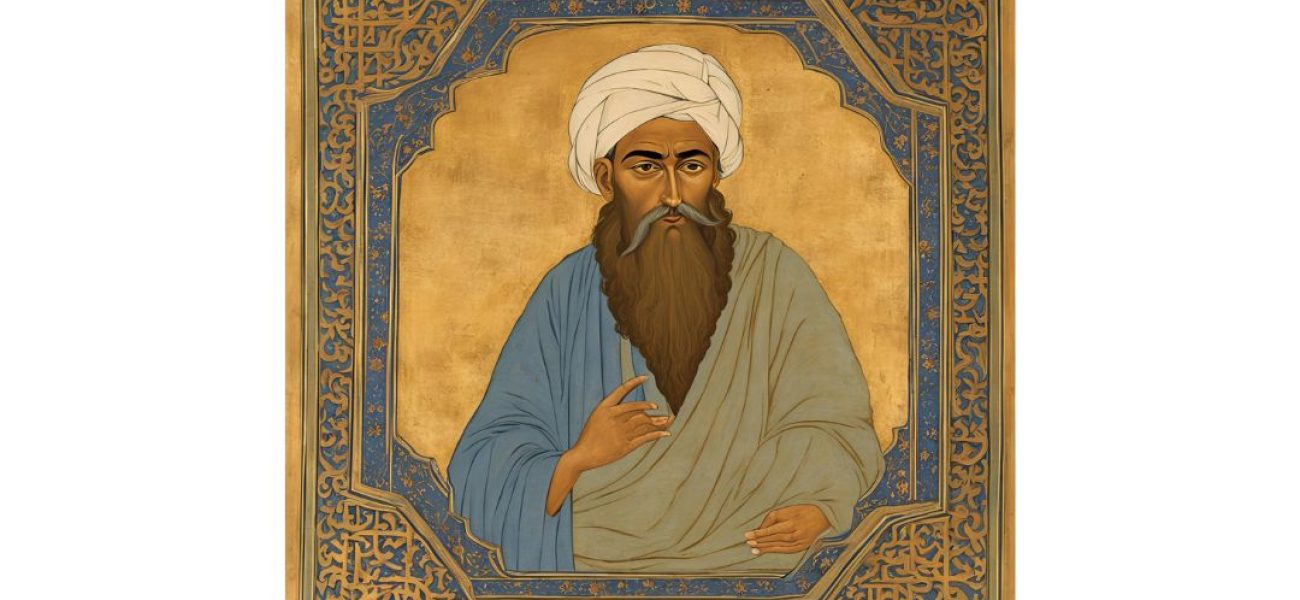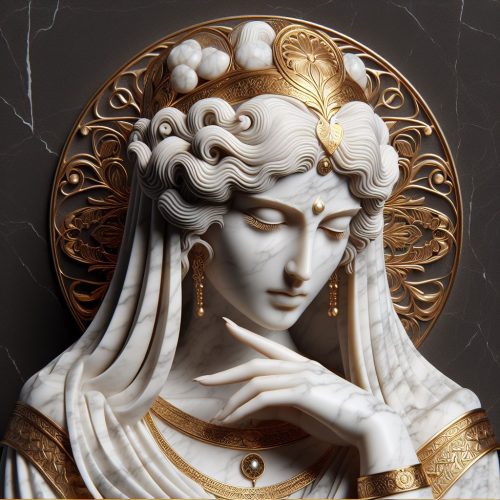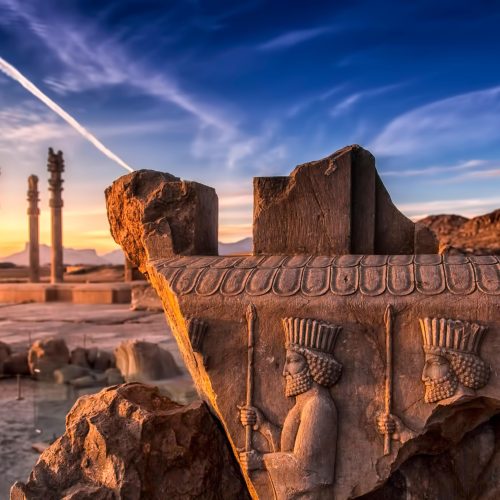The Poet Lost to Time
In the vast expanse of Persian literature, names like Ferdowsi, Rumi, and Hafez loom large, casting a grand shadow over the historical landscape. Yet, beneath this towering canopy of poetic giants, there are quieter voices, subtler souls who once stirred the hearts of their time but have, over centuries, receded into the dim corners of memory. One such voice is Asjadi, a poet whose life and works reflect the richness of the Persian literary tradition, yet whose name has been unjustly neglected.
Asjadi, often overshadowed by his contemporaries in the court of the Ghaznavids, lived during the 11th century, in the same breath of history as the renowned Ferdowsi. His poetry, which ripples with the elegance of classical Persian poetics, offers us glimpses into a world of grandeur and turmoil, of loyalty and courtly patronage, of battles and fragile beauty. Asjadi, though not often credited with a prolific corpus, deserves our attention for the subtle craftsmanship of his verse, his role as a court poet, and his influence on the subsequent generations of Persian poets.
Today, as we navigate the digital archives of Persian history, it becomes imperative to resurrect the name of Asjadi from the sands of Khurasan. This article attempts to celebrate him, not simply as a poet lost to time, but as a voice resonant with the very essence of Persian identity—a voice that sang of kings and lovers, of victories and losses, of Persian dignity, and of human frailty.
His Life: A Poet in the Court of Power
Much of Asjadi’s early life remains shrouded in mystery, as if the man himself were an enigma that the passing centuries have sought to obscure. We know that he lived in the 11th century during the reign of the Ghaznavid sultans, notably Mahmud of Ghazni and his son, Mas’ud I. Born in Khurasan, the northeastern region of the Persian cultural sphere, Asjadi was immersed in the intellectual and literary currents of the time, a world where Persian culture flourished under the patronage of royal courts.
Khurasan in the 11th century was no ordinary province. It was a center of learning, art, and scholarship—a fertile ground for poets, scholars, and philosophers alike. The Ghaznavid dynasty, with its capital at Ghazni, ruled over a vast territory stretching from the Persian heartlands to the plains of India. Under Mahmud, the court of Ghazni became a beacon for poets and intellectuals, attracting figures like Ferdowsi, Unsuri, Farrukhi, and, of course, Asjadi himself.
It was in this illustrious environment that Asjadi’s poetic talents came to maturity. His poetry, like that of many court poets of the era, reflected both the grandeur and the fragility of the rulers he served. As a court poet, Asjadi was tasked with composing panegyrics—poems of praise—dedicated to his royal patrons. Yet, beneath the surface of courtly flattery, his verses revealed a deeper engagement with the themes of loyalty, the passage of time, and the transient nature of power.
Asjadi, like many poets of his time, walked a delicate line between artistic independence and royal servitude. His livelihood depended on the favor of the sultans, yet his soul yearned for the freedom to express the truths of life. It is in this tension, between duty and desire, that his poetry finds its most poignant expressions.
The Poet and His Patrons: Navigating the Courtly World
In the realm of classical Persian literature, poets often found themselves bound to the whims and desires of their patrons. For Asjadi, this meant weaving verses that exalted the rulers of the Ghaznavid dynasty, particularly Sultan Mahmud and later his son Mas’ud I. These rulers, with their grand ambitions and military campaigns, were the living embodiments of Persian kingship, and the poets of the court were tasked with preserving their legacy in the gilded verses of eternity.
To be a poet in such a courtly environment required not only artistic talent but also political acumen. The poet had to navigate the intricate power dynamics of the court, to know when to flatter and when to critique, when to laud a victory and when to console a loss. Asjadi was no stranger to these dynamics. His verses reflect a keen awareness of the fragility of power, a theme that runs like a delicate thread through much of his poetry.
In one of his more famous qasidas (a traditional Persian form of praise poetry), Asjadi extols the virtues of Sultan Mas’ud after a military victory. The poem brims with the grandeur of Persian kingship, likening Mas’ud to the ancient kings of Iran, whose legacy stretched back to the mythical times of the Shahnameh. Yet, as we read between the lines, we sense a subtle undercurrent of melancholy—a recognition that even the greatest of kings are subject to the inexorable passage of time.
Asjadi’s role as a court poet, however, was not merely to glorify. He was also a keen observer of the human condition. In his panegyrics, we see glimpses of the poet’s personal reflections on the fleeting nature of wealth, power, and glory. It is in these moments of introspection that Asjadi’s poetry transcends the confines of courtly obligations and enters the realm of the universal. His words, though addressed to kings, speak to the heart of every human being who has ever wrestled with the impermanence of life.
Asjadi’s Works: The Echoes of a Poet’s Craft
While the surviving works of Asjadi may not rival the sheer volume of Ferdowsi’s Shahnameh, what remains of his poetry reflects the refinement of classical Persian verse. Asjadi was primarily a composer of qasidas, but his poetic sensibilities extended far beyond the formal constraints of praise poetry. His mastery of language, his ability to evoke vivid imagery, and his deep philosophical insight all contribute to the lasting power of his verses.
One of the central themes in Asjadi’s poetry is the impermanence of human life and the ephemerality of power. In his qasidas, we encounter not only praise for the rulers but also reflections on the nature of kingship itself. Asjadi, like many Persian poets before and after him, was keenly aware of the cyclical nature of history. His poetry often hints at the fact that even the greatest empires will one day crumble, that even the most powerful kings will eventually fall into the oblivion of time.
In one particularly striking poem, Asjadi writes:
“The world is a wheel, spinning in relentless motion, Its turns are many, its pauses few. Today a king, tomorrow a beggar, For in the end, all are equal before time’s scythe.”
These lines encapsulate Asjadi’s philosophy, a philosophy steeped in the rich tradition of Persian thought. The world, to Asjadi, is a place of constant change, where fortune is fickle, and nothing endures forever. It is a sentiment that echoes throughout Persian poetry, from the verses of Ferdowsi to the ghazals of Hafez.
In addition to his qasidas, Asjadi is known to have composed ruba’iyat (quatrains), though much of this work has been lost to time. The ruba’i, with its succinct form, allowed poets to convey deep philosophical insights in just a few lines, and Asjadi’s quatrains often reflect the same preoccupation with time, fate, and the human condition. Unfortunately, only a few of these ruba’iyat have survived, but they stand as a testament to the breadth of Asjadi’s poetic talents.
The Influence of Asjadi: A Poet’s Legacy
Though Asjadi’s name may not be as well-known today as those of his more famous contemporaries, his influence on the Persian literary tradition is undeniable. He was a key figure in the courtly poetic tradition that flourished under the Ghaznavids, and his mastery of the qasida form set a standard for generations of poets who followed in his footsteps.
One of Asjadi’s most notable contributions to Persian literature was his role as a mentor and influence on later poets. He is often credited with having been a teacher or mentor to Anvari, one of the most celebrated Persian poets of the 12th century. Anvari, who rose to prominence in the courts of the Seljuqs, carried forward the tradition of courtly poetry that Asjadi helped to shape. The themes and forms that Asjadi perfected in his qasidas—praise, reflection, and philosophical insight—would continue to resonate in Persian poetry for centuries to come.
Furthermore, Asjadi’s poetry, with its delicate balance of praise and introspection, influenced not only his immediate successors but also the broader Persian poetic tradition. His reflections on the nature of kingship, the impermanence of life, and the role of fate would find echoes in the works of later poets like Sa’di and Hafez, whose ghazals often grappled with similar themes. While these later poets may have surpassed Asjadi in fame and influence, it is important to recognize the foundational role that Asjadi played in shaping the intellectual and artistic landscape of Persian poetry.
The Tragic Silence: Why Has Asjadi Been Forgotten?
The question remains: why has a poet of Asjadi’s stature been relegated to the margins of history? Why has his name, once spoken with reverence in the courts of Khurasan, been so largely forgotten?
Part of the answer lies in the nature of literary fame itself. History, as we know, is not always kind to those who dwell in the shadows of giants. Asjadi lived and wrote in an era that was dominated by towering figures like Ferdowsi, whose monumental Shahnameh eclipsed the works of many other poets of the time. In the face of such overwhelming genius, even a poet of Asjadi’s caliber could be overlooked.
Moreover, the survival of literary works is often subject to the whims of fate. Many of Asjadi’s poems have been lost over the centuries, either due to the ravages of time or the changing tastes of literary audiences. What remains of his work is but a fraction of what he likely produced during his lifetime. The loss of these poems has undoubtedly contributed to the fading of his legacy.
Yet, in the grand tapestry of Persian literature, no thread is ever truly lost. Asjadi’s influence, though subtle, continues to weave its way through the works of later poets, and his name, though obscured by time, remains a part of the rich heritage of Persian poetry.
Asjadi’s story is one of both triumph and tragedy—triumph in the beauty of his verses and the lasting impact of his poetic craft, tragedy in the obscurity into which he has fallen. But perhaps, in this obscurity, there is a certain poetic justice. For Asjadi, the poet who wrote so often of the fleeting nature of life and power, now embodies the very transience he so eloquently described.
It is up to us, the readers of Persian literature in the modern age, to rediscover poets like Asjadi, to bring their voices back into the light, and to celebrate the contributions they made to the cultural and intellectual history of Iran. For in the verses of poets like Asjadi, we find not only the soul of a forgotten era but also the timeless truths of human existence—truths that speak to us as clearly today as they did a thousand years ago.
As we reflect on the life and works of Asjadi, let us remember him not as a poet lost to time, but as a poet whose voice still echoes in the corridors of Persian history—a voice that reminds us of the fragility of power, the impermanence of fame, and the enduring beauty of the written word.




